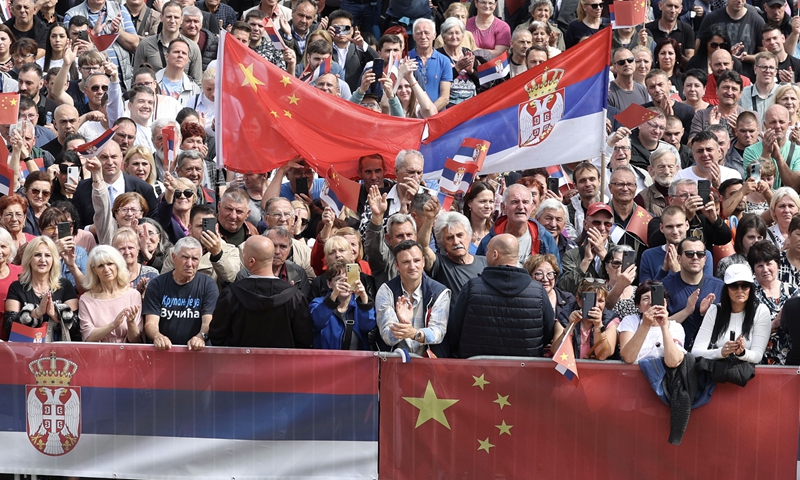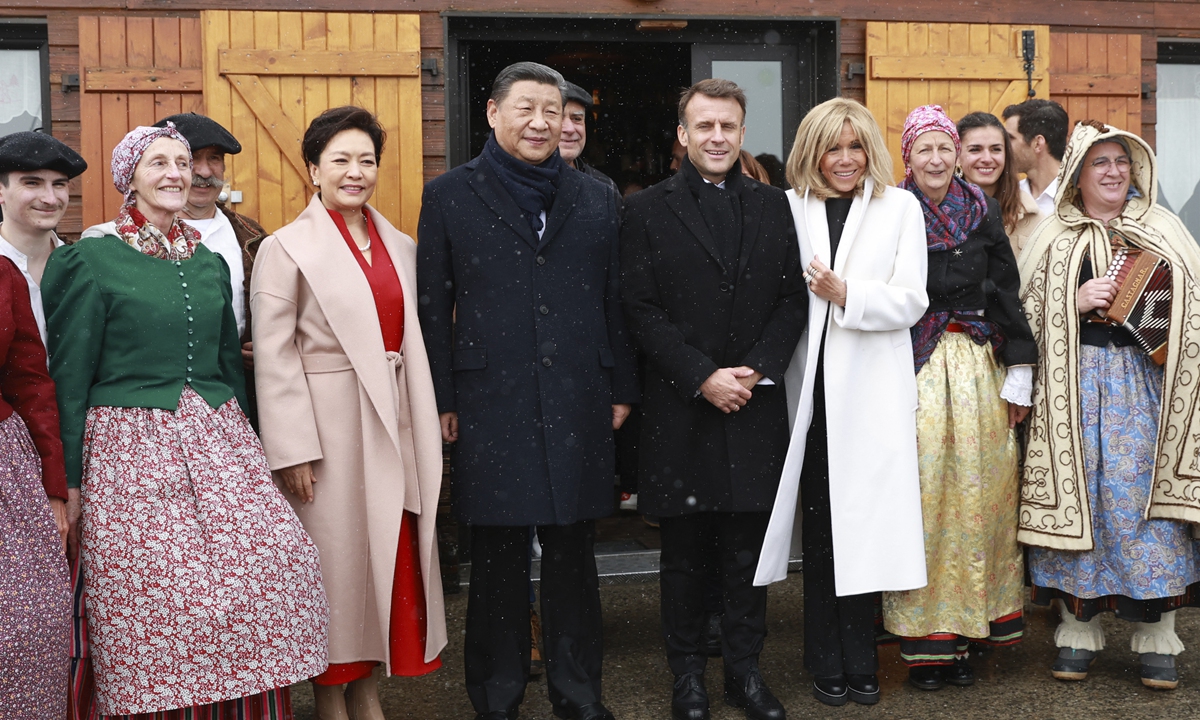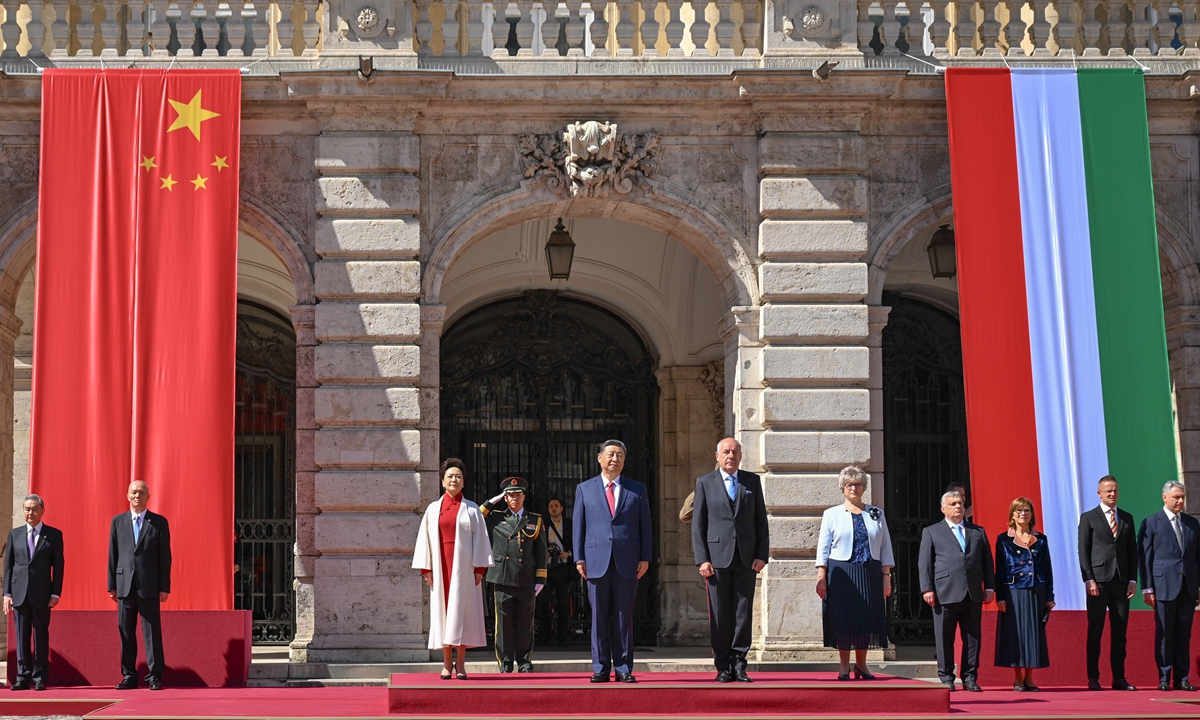Chinese President Xi Jinping attends a welcome ceremony jointly held by Hungarian President Tamas Sulyok and Prime Minister Viktor Orban in Budapest, Hungary, on May 9, 2024 Photo: Xinhua
 Tens of thousands of Serbian people chant "China! Serbia!" while waving Chinese and Serbian national flags as they welcome the visiting Chinese President Xi Jinping in Belgrade on May 8, 2024. Photo: Xinhua
Tens of thousands of Serbian people chant "China! Serbia!" while waving Chinese and Serbian national flags as they welcome the visiting Chinese President Xi Jinping in Belgrade on May 8, 2024. Photo: Xinhua
In summarizing the visit of Chinese President Xi Jinping to three European countries, the Chinese Foreign Minister Wang Yi said on Saturday that the visit, taking place in Europe with a global vision, successfully strengthened China-France relations, further solidified China-Serbia relations, enhanced China-Hungary relations, and injected momentum to China-EU cooperation.
It was a journey to build on friendships, increase mutual trust, boost confidence, and chart a course for the future, which has concluded in great success, the Chinese top diplomat said.
Over the past few years, with the global uncertainties, growing challenges that Europe has been facing, and the twists and turns in China-EU relations, a high-level exchange is necessary to clarify matters, prevent further decline, and stabilize relations, while fostering future-oriented development, some experts said, noting that head-of-state diplomacy, as the highest level of diplomatic exchange, is crucial at this critical moment.
During the visit, China and France upheld the original spirit of establishing diplomatic ties, and will advance the bilateral relations by building on past achievements and pioneering new developments, Wang noted.
We will continue to sustain our ironclad friendship and embark on a new journey to build a China-Serbia community with a shared future in the new era, and will strengthen traditional ties and guide China-Hungary relations into a "golden voyage," Wang said.
On China-EU relations, the two sides should shape correct perceptions and adhere to the positioning of partnership. On global issues, China will demonstrate the responsibility of a major power and contributing China's solutions for world peace, the Chinese top diplomat noted.
This visit demonstrates China's great emphasis on Europe and its special attention to these three countries - France, Serbia and Hungary, Sun Keqin, a research fellow at the China Institutes of Contemporary International Relations, told the Global Times on Sunday.
The trip conveyed to Europe and the world China's stance and attitude on China-EU relations, global peace and development, especially on the Russia-Ukraine conflict, and the Israel-Palestine conflict, Sun noted.
It also addressed major international issues, such as global governance, and clarified misunderstandings about China's role in the Russia-Ukraine war and debunked the so-called overcapacity in China rhetoric, Sun said. "By positively stating its position, China has effectively countered anti-China forces in Europe and helped more Europeans understand China's perspective on these issues, responded to malicious slander and attacks in some Western media."

Chinese President Xi Jinping and French President Emmanuel Macron together with their wives, Peng Liyuan and Brigitte Macron, pose for a group picture with local folklore dancers at the Tourmalet pass, in the Pyrenees mountains, on May 7, 2024. Photo: AFP
Memorable momentsPresident Xi's visit to the three European nations left many memorable diplomatic moments, the Xinhua News Agency said on Sunday. From talks at the Élysée Palace in Paris to chats at Tourmalet pass in the Pyrenees; from the welcoming crowds in a Serbia Square to the farewell ceremony at the Villa Peace in Belgrade; from the flowers at Budapest Airport to the welcoming ceremony at Buda Castle in Budapest … These vivid scenes and remarkable diplomatic stories from President Xi's European visit are unforgettable, Xinhua said.
The New York Times said French President Emmanuel Macron "adds a personal touch to his diplomacy with China," as he took Xi to his childhood haunts high, hoping to forge a bond. The AFP described the impressive scene in Belgrade where Xi and Serbia's President Aleksandar Vucic "waved from a balcony to several thousand people."
During the visit to Serbia, President Xi and Vucic agreed to build a China-Serbia community with a shared future in the new era, and Xi also announced a range of measures to support the building of China-Serbia community with a shared future.
Wang said this decision marks a breakthrough in Europe for the building of a community with a shared future, which will become a new milestone in the history of China-Serbia relations.
In all three European nations, from reception protocols to personal interactions between leaders, the warm hospitality showed the host countries' high regard for President Xi's visit and relations with China, Dong Yifan, a research fellow at the Institute of European Studies, China Institutes of Contemporary International Relations, told the Global Times on Sunday.
"The reception was of the highest standard, underscoring the importance of this visit," Dong said, noting that the visit holds significant diplomatic meaning for China, which reflects Europe's prominent position in shaping global relations and the strategic importance of China-EU relations.
On Xi's visit, Wang also noted that "First Lady diplomacy" was a highlight of this visit as Peng Liyuan's charming diplomacy played a positive role in enhancing the foreign public's goodwill toward China and boosting China's soft power.
"First Lady diplomacy" has two key characteristics: a feminine touch and a focus on people-to-people and cultural exchanges, Song Luzheng, a Chinese scholar residing in France and a research fellow at the China Institute of Fudan University, told the Global Times on Sunday.
These aspects effectively complement the often overly formal and serious discussions between heads of state, emphasizing emotional connections and engagement in areas of consensus such as the humanities, language and culture, helping foster closer ties between people, Song said.
Implications for China-EU ties Whether in EU elections or EU affairs, France and Germany play special roles. From the day the EU was founded, France has served as a political leader, acting as a "political engine," some experts said. Meanwhile, Germany remains an irreplaceable economic leader in the EU.
Ahead of Xi's visit to Europe, German Chancellor Olaf Scholz also travelled to China in mid-April and had in-depth discussions on bilateral relations, regional as well as global affairs.
Over the past few years, China-EU relations have faced various challenges due to geopolitical competition, the Russia-Ukraine conflict, and the expanding influence of the US. France remains committed to strategic autonomy and is the most influential power in the EU, Sun noted.
By engaging with France and EU leaders on various issues, we can clarify whether we are partners or systemic rivals. Their perception is critical for the smooth development of China-EU relations, allowing us to understand each other's positions and establish a solid foundation for managing differences and strengthening cooperation, Sun said.
Hungary is scheduled to take over the Council of the EU on July 1, and it will use its veto power if necessary once it assumes the rotating presidency, Euronews reported in April.
Some experts said that given the unique structures of the EU and NATO, Hungary can play a crucial role, especially in the EU's consensus-based decision-making on major issues, and Hungary has for multiple times exercised its veto power against anti-China resolutions in the European Parliament and the EU.
In
an exclusive interview with the Global Times recently, Levente Horvath, director of the Eurasia Center at John von Neumann University, said Hungary is expected to play a positive role in China-EU relations during its upcoming EU presidency, hoping to influence the bloc's thinking about China.
Some Western media, citing analysts, said the Chinese leader made an impression but no real breakthroughs on trade and Ukraine tensions. And some observers claimed that China "has gradually divided Europe into two groups: those friendly and unfriendly to China," German news outlet DW News said on Saturday in one article.
European public opinion is generally pro-US, often making negative interpretations of China, some experts said, noting that however, since the beginning of this year, there have been many exchanges between China and Europe, with visits from Belgium, the Netherlands and Germany.
"Therefore, it's not about China seeking to divide Europe but simply normal diplomatic visits. Moreover, the three countries that President Xi visited are relatively friendly toward China," Sun noted.
Such friendliness is based on their own interests, objective considerations, and mutually beneficial cooperation. This approach represents European pragmatism and the direction of China-EU relations. "Therefore, it is incorrect to label this form of cooperation as an attempt to divide Europe," Sun said.

 Tens of thousands of Serbian people chant "China! Serbia!" while waving Chinese and Serbian national flags as they welcome the visiting Chinese President Xi Jinping in Belgrade on May 8, 2024. Photo: Xinhua
Tens of thousands of Serbian people chant "China! Serbia!" while waving Chinese and Serbian national flags as they welcome the visiting Chinese President Xi Jinping in Belgrade on May 8, 2024. Photo: Xinhua



